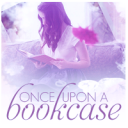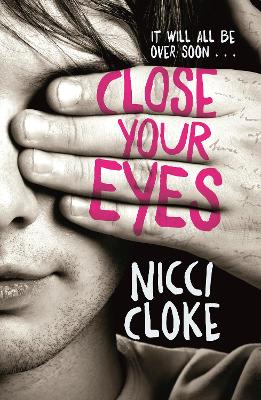
Jo
When I first picked up Close Your Eyes by Nicci Cloke, I didn't know just how complicated and thought-provoking this story was going to be. Nothing is as simple as it looks, and everyone sees things differently.
Close Your Eyes is about a diverse group of friends, how their friendships change over the course of a year, and how those changes lead to one of them picking up a gun and taking it to school. The story is told half in retrospect, after the shooting, with transcripts of interviews with some of the friends, one of the teachers, a psychologist, but also with news and radio reports. Those (we never really know who) who are putting all of this information together also use blog posts, diary entries, and text messages between the friends from before the school shooting, too. And the book is told half in third person from the perspective of a number of friends, of the events leading up to the shooting, as they happen.
What's really clever is the way the book is put together. The third person narration is told in chronological order, from a holiday the six friends went on until after the shooting. The epistolary part of the story almost feels like a jigsaw puzzle; We'll be shown an interview with one of the friends, then something in third person from that friend's perspective (showing the difference in what they say happened and what actually did happen), then next we'll have an interview with a psychologist, who seems to be talking about what we've just read about. For the most part, the interviews with the friends, the text messages, the blog posts, correspond to the third person narration, but everything else, there's nothing that says it's to do with the specific event you just read about, but it very much feels like it is.
You'll have noticed I've not mentioned which friends narrate the story, whose blog posts are used, etc. This is due to spoilers. The narration changes hands as the story progresses; one tells the story for a while, then someone else takes over, and then things change again. So at the beginning of the book, you don't know who will be narrating later, and as the interviews also correspond with the narration - interviews with the friends after the shooting - to say who narrates is also to say who survives. Even though part of the story is being told in retrospect, certain things are only revealed to the reader at certain times, so you never quite know. You're being guided through the story; you've been taken by the hand and are walking down a certain path, a path of the leader's choosing. So, in some ways, there's a mystery aspect to the story.
And, really, there's a mystery aspect to the whole story. You're being led to believe that friend X is the shooter, but while you're being led to believe this, from the way the epistolary side of things is pieced with the narration, it is never actually said that "X was the shooter." So is it X? Everything points to X, but is it too easy to be X? Or is that the point, a double bluff? Because it looks like it's X, we may doubt it is X, have us guessing it might be someone else... and then end up being X anyway? It was very, very clever. There were a couple of days in the middle of reading Close Your Eyes I was unable to read for, but I was still thinking about the story. I thought about where I was in the story, and about what I had read so far. I was thinking it was far too easy to be X - I've read Cloke's previous novel, Follow Me Back, and knew how good Cloke was at twists and the unexpected - and then something struck me. Something a psychologist said. It seemed at the time to be talking about X, but I then realised it's quite possible what the psychologist was talking about could refer to Y! From then on, I was convinced it was Y, and I thought myself so clever as little things I remembered from what I'd previously read, and what followed when I could read again all seemed to fit my theory. But it turned out I was completely wrong. As I said above, nothing is as simple as it seems.
As clever as Close Your Eyes is, it is also heartbreaking. There are things about the past of a number of characters' pasts that are just unimaginable. Close Your Eyes really plays on your emotions, because you end up really feeling for those it would be easy to tar with the "bad" brush, and being really bloody upset with those who are "innocent". Though it depends on how you define innocent, and how you define bad. Because what this book is really about is bullying, and the consequences - the effects - of your actions, no matter how small. What is bullying, anyway? Teasing someone a little here, a laugh at someone's expense there - just what friends do, right? There's no malice in it, and definitely no harm. But is there? We don't know what people have been through, we don't know their pasts, so we don't know how that will affect them. And, as an outsider, we don't really know what is going through the head of the one making the joke, or the one laughing. And then there's perspectives and the truth; you can have A think B is just shy, that there's nothing weird about them being quiet and observant, but then C can think B is creepy the way they watch everything, notice everything, plotting maybe, and then you can have the real reasons B is like they are. And if you're C who feels a little uneasy around B, not knowing about B's past? Even though they are your friend, what might you do? There are a lot of people who do a lot of bad things, some small, some huge. They may not have a gun in their hand, they may not be taking life, but they're definitely not innocent. And you never know how much can be too much for some one, nor how someone who it's too much for will react. So, like the description above says, who is truly responsible? It's really very thought provoking.
There's one niggle I had with this book. Once we get to the shooting and we're inside the shooter's head, it is very clear that this person is in need of help. I couldn't say for sure that they have a mental illness, because I'm not a doctor, but they definitely need counselling. It does feel like they have a problem, though, that they could potentially have a mental illness - and there are even interviews with a psychologist who talks about the shooter's past and what that could mean to them. And that made me feel a little uneasy. When things like this happen - when someone picks up a gun and goes on a shooting rampage - the state of their mental health is questioned, or any mental illness they have come to light. I worry that this story may be adding to that idea the news perpetuates when things like this happen, that those with mental illness are dangerous, and therefore upholding the stigma surrounding mental illness. I don't know, I simply don't know enough to be sure that that's what this book is doing. At the same time, for the shooter to not need help, their whole backstory would need to change, because they need help long before they pick up a gun. I don't know what the answer is here, but it did make me feel a little uncomfortable.
Still, Close Your Eyes is a very clever, very thought-provoking, and very upsetting novel. The scenes when the shooting is taking place, the accounts of it - even though I knew it had already happened and was over - it was just terrifying. I felt for the shooter, but I also feared them. Close Your Eyes has so many layers to it, and is so complex; this is more than just a school shooting with a whodunnit element, this is a story about people, how we can never really know people, and a book, I feel, promotes kindness and compassion. What Cloke has done with this story, with these characters... it's pretty incredible.
Thank you to Hot Key Books for the eProof.
